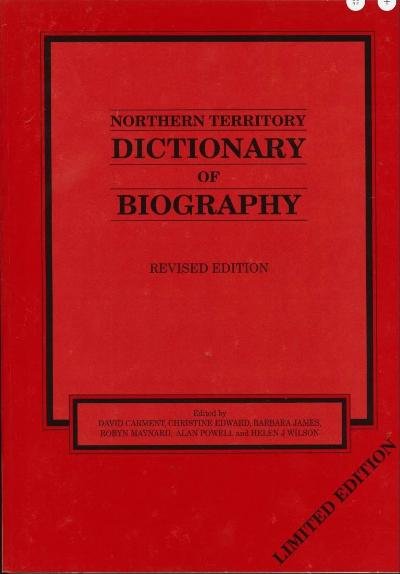Description
Northern Territory Dictionary of Biography
The Northern Territory Dictionary of Biography is an essential historical resource that chronicles the lives of individuals who have shaped the development and character of the Northern Territory. As a vast, remote, and diverse region of Australia, its history is rich with stories of pioneers, indigenous leaders, and people whose contributions have left a lasting impact on the territory’s culture, society, and economy. In this article, we’ll explore the significance of this biographical dictionary, its structure, and how it provides valuable insights into the Northern Territory’s past.
The Purpose of the Northern Territory Dictionary of Biography
The Northern Territory Dictionary of Biography (NTDB) was created with the goal of preserving the stories of those who played a significant role in the development of the region. It serves as both a reference for researchers and a testament to the individuals who have contributed to shaping the territory’s identity. By documenting these personal histories, the NTDB offers a unique window into the past and helps highlight the diversity of experiences and backgrounds of those who lived and worked in the Northern Territory.
Historical Background of the Northern Territory
The Northern Territory, located in the northern part of Australia, is a region with a complex and dynamic history. It was initially explored by Europeans in the 1800s, although it had been home to indigenous populations for thousands of years prior to European settlement. The arrival of British settlers and explorers brought significant changes to the territory, including the establishment of early settlements, such as Darwin, the capital city. The Northern Territory’s historical significance is often linked to its remote location, indigenous cultures, and the natural challenges faced by those seeking to develop it.
Development of the Northern Territory
Over the centuries, the Northern Territory has seen dramatic changes in its development. From the initial establishment of ports and settlements to the expansion of infrastructure and industries such as mining, agriculture, and tourism, the territory has evolved from a sparsely populated frontier to a vital region of Australia. The stories of the individuals who played roles in these developments are well represented in the Northern Territory Dictionary of Biography.
The First Edition of the Dictionary
The first edition of the Northern Territory Dictionary of Biography was a major milestone in historical scholarship for the region. Published in the late 20th century, it brought together the efforts of numerous scholars, historians, and editors who aimed to provide a comprehensive record of notable figures in the territory’s history. This edition covered a wide range of people, including political figures, business leaders, indigenous activists, and explorers.
Content and Structure of the Dictionary
The NTDB is meticulously organized to offer easy access to biographical entries. Each entry provides detailed information about the individual’s life, contributions, and the historical context in which they lived. The dictionary is arranged alphabetically and includes thematic groupings, such as categories for indigenous leaders, settlers, women in the territory, and more. This structure allows readers to explore the history of the Northern Territory through the lens of its most influential figures.
Influential Figures Highlighted in the Dictionary
Among the many individuals highlighted in the NTDB, a few stand out for their exceptional contributions. These include explorers such as John McDouall Stuart, who led expeditions through the territory, and indigenous leaders like Vincent Lingiari, whose activism helped reshape land rights in Australia. The inclusion of such figures demonstrates the NTDB’s commitment to reflecting the diverse history of the Northern Territory.
Indigenous Contributions to the Northern Territory
The indigenous populations of the Northern Territory have played a critical role in shaping its cultural and political landscape. The NTDB places a strong emphasis on including the biographies of indigenous figures, recognizing their leadership, wisdom, and influence. From political activists who fought for indigenous rights to community leaders who helped preserve cultural traditions, these stories add depth to our understanding of the region’s history.
The Role of Women in Northern Territory History
The role of women in the Northern Territory’s development cannot be understated. The NTDB highlights the achievements of women in various fields, from politics and business to education and healthcare. Figures like Jeannie Gunn, who wrote about her experiences in the Outback, are featured prominently, showcasing the often overlooked contributions of women in a traditionally male-dominated environment.
Social and Political Influences of the Biographies
The biographies in the NTDB reflect the broader social and political movements that have shaped the Northern Territory. Many of the individuals featured were involved in significant political events, such as the push for self-governance in the 1970s or the fight for indigenous land rights. These biographies provide valuable context for understanding how political change has impacted the region.
Economic and Cultural Contributions
The Northern Territory’s economy has been shaped by various industries, from mining to agriculture. The NTDB highlights the entrepreneurs, business leaders, and innovators who have driven economic growth in the region. Additionally, cultural figures such as artists, writers, and performers are celebrated for their contributions to the territory’s unique cultural heritage.
Challenges in Documenting Biographies
Documenting the lives of individuals from a region as remote and diverse as the Northern Territory comes with challenges. The editors of the NTDB had to navigate gaps in historical records, the oral traditions of indigenous communities, and the vast geographical distances that sometimes made research difficult. Despite these challenges, the NTDB has managed to compile a comprehensive and accurate account of the people who shaped the territory.
Updates and Future Editions
Since its initial publication, the Northern Territory Dictionary of Biography has seen several updates and expansions. These editions include more recent figures and aim to fill in gaps left by earlier versions. As the Northern Territory continues to grow and evolve, future editions of the NTDB will undoubtedly include new biographies that reflect the changing face of the region.
Impact of the Dictionary on Historical Research
The NTDB is an invaluable resource for historians, researchers, and anyone interested in the history of the Northern Territory. Its detailed entries provide insight into the lives of those who played key roles in shaping the region, making it a crucial tool for understanding the past. The dictionary not only preserves individual stories but also helps build a collective narrative of the territory’s development.
Conclusion
The Northern Territory Dictionary of Biography is more than just a collection of names and dates—it’s a window into the heart of the region. By capturing the stories of those who have influenced the territory’s history, it offers a rich and diverse understanding of the people and events that have shaped the Northern Territory. For anyone looking to explore the past of this unique region, the NTDB is an essential starting point.
FAQs
- What is the Northern Territory Dictionary of Biography?
It is a historical reference work that documents the lives of significant individuals who contributed to the development of the Northern Territory. - Who are some of the key figures featured in the NTDB?
The NTDB includes a wide range of individuals, from explorers like John McDouall Stuart to indigenous leaders like Vincent Lingiari. - Why is the NTDB important for researchers?
The NTDB provides valuable biographical information that helps researchers understand the historical and social context of the Northern Territory. - How often is the NTDB updated?
While the NTDB was initially published in the 20th century, it has been updated periodically to include more recent figures and fill gaps in earlier editions. - Can the general public access the NTDB?
Yes, the NTDB is available to the public, both in physical form and through online platforms, making it accessible to a wide audience.




Reviews
There are no reviews yet.